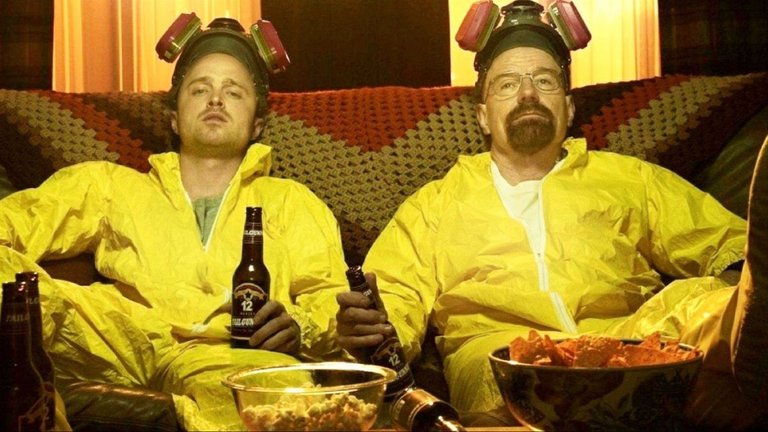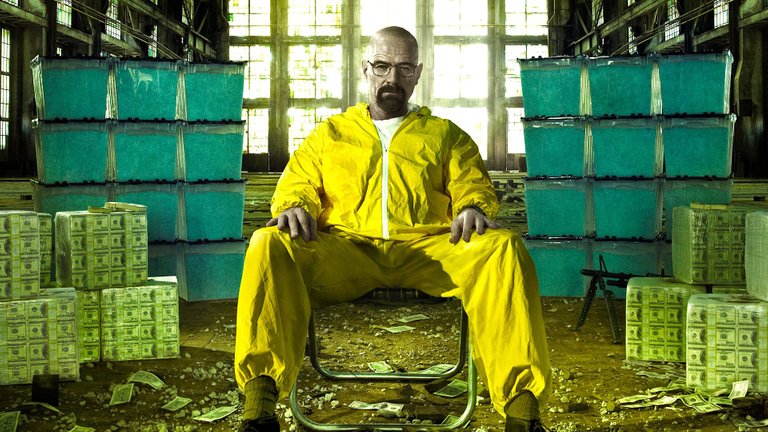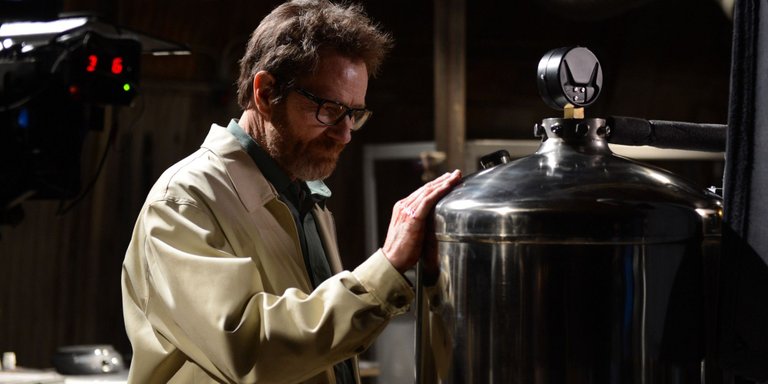
In order to understand our behaviour as human beings, it is essential to recognise that we are first and foremost social creatures. In strict solitude, we tend to be completely different from our versions in groups. These concepts are true in the everyday life of every human being but also within the multi-award winning fiction, created by Vince Gilligan, for AMC, and available on Netflix; I am referring here to Breaking Bad. This is a different review, where we will explain plot aspects of the series, unforgettable episodes but also to focus on Walter White, and his personality. Because let's remember one thing: "going bad" is not something that happens from one day to the next, it is a process. There is cynicism, selfishness, but above all vanity.
And these fundamental components are not to be taken lightly, they are no small thing, nor are they in the script, throughout the 5 seasons of the series, just by mere chance. Honestly, Breaking Bad has to be the best portrayal of negative emotions I have ever seen. In a society where it is taboo to show anger, hatred, revenge and vanity, that at least one masterful series not only shows these human feelings but also contains a behavioural thread that explains why, is wonderful. And frankly, from my perspective, this is what hooked me from episode one. Obviously, seeing everything in retrospect, because when I saw it for the first time, what really captivated me is the father-love-hate relationship between Walter, his serious economic and health problems and Jesse Pinkman; the rebellious, problematic, lazy and drug addicted ex-student, who within this trinomial that I explain is exceptional for many of the behaviours and actions done by our protagonist.
Breaking Bad premiered on AMC on 20 January 2008 in the United States of America. Remember, in the midst of the mortgage crisis in that country. And within the story of Breaking Bad, the trigger for the dizzying change in Walter's personality is precisely the imminence of a relatively early, hard, long and, above all, costly death. Not to mention that for most of his productive life, he had lived on a shoestring between being a highly overqualified professor of organic chemistry and spending his short spare time as a carwash worker. All this without adding that he is a genius (the character), an absolute genius. And this is not an opinion, it is a reality within the fiction of the series, which in a flashback scene, explains that the main character has a Nobel Prize in chemistry for a revolutionary work in this field of study. But let's not get ahead of ourselves, we'll see...
Para poder entender nuestro comportamiento como seres humanos, es imprescindible reconocer que somos, ante todo, criaturas sociales. En estricta soledad, solemos ser completamente distintos a nuestras versiones estando en grupos. Estos conceptos son ciertos en el día a día de cada ser humano pero también dentro de la ficción multipremiada, creada por Vince Gilligan, para AMC, y que está disponible en Netflix; me refiero aquí a Breaking Bad. Esta es una review diferente, donde se explicarán aspectos argumentativos de la serie, episodios inolvidables pero también para concentrarnos en Walter White, y su personalidad. Porque recordemos una cuestión: "volverse malo" no es algo que sucede de un día hacia el otro, sino que es un proceso. Hay cinismo, egoísmo pero sobre todo vanidad.
Y estos componentes fundamentales no se pueden tomar a la ligera, no es poca cosa, ni tampoco están dentro del guión, a lo largo de las 5 temporadas de la serie, solo por mera casualidad. Honestamente, Breaking Bad, debe contar con la mejor interpretación de las emociones negativas que haya visto en mi vida. En una sociedad donde es tabú mostrar, la ira, el odio, la venganza y la vanidad, que al menos en una serie magistral no solo sean mostrados esos sentimiento humanos sino que contenga un hilo conductual que explica el por qué, es maravilloso. y francamente, desde mi óptica, esto es lo que me enganchó desde el capítulo uno. Obviamente, viendo todo en retrospectiva, porque cuando la vi por primera vez lo realmente cautivante es la relación paterna-amor-odio entre Walter, sus problemas graves de economía y salud y Jesse Pinkman; el ex alumno rebelde, problemático, flojo y drogadicto, que dentro de este trinomio que explico resulta excepcional para muchas de las conductas y acciones hechas por nuestro protagonista.
Breaking Bad, fue estrenada en AMC, el 20 de enero de 2008, en los Estados Unidos de América. Recordemos, en plena crisis hipotecaria en aquél país. Y dentro del relato de Breaking Bad, el desencadenante del vertiginoso cambio de personalidad de Walter, es precisamente la inminencia de una muerte relativamente pronta, dura, larga y sobre todo costosa. Sin incluir, que durante casi toda su vida productiva, había vivido al límite de sus gastos entre ser un muy sobre cualificado profesor de química orgánica y pasar su corto tiempo libre como trabajador de un Carwash. Todo esto sin añadir, que es un genio (el personaje), un absoluto genio. Y no es una opinión, es una realidad dentro de la ficción de la serie, que en una escena en modo flashback, explica que el personaje principal cuenta con un Nobel en química por un trabajo revolucionario en este campo de estudio. Pero no nos adelantemos, ya lo veremos...

How does someone decent, brilliant (a genius), an excellent father to his children, apparently a good husband and completely normal and predictable in his behaviour, become Heisenberg? I believe it is through circumstance. And I want to be emphatic in my analysis, this is by no means an ode to the production of drugs or the world of violence, not at all; but it is a review with psychological overtones. Even if it is a non-factual, or fictional, character. Having clarified this issue, I want to start by saying that what makes us who we are is the repetition of behaviours, but also the peace of mind we have at the moment of deciding to implement those habits. In other words, Walter was Walter as long as his health, his relative economy allowed him to do so, and as long as he and his family were not in imminent danger. There are archetypes, of course there are: the hero is an undeniable one, for example.
But when that delicate balance is broken, cracked or outright threatened, what we have always had inside us but repressed often takes over. In many cases, we know it as anger or rage, but in the case of our protagonist, I would call it cognitive dissonance. And this is the only psychological criticism I have for Walter as a character. That he, throughout the whole series, saw that he was the only one with the responsibility of financially supporting his entire family, and that without him in this world (remember, he has extremely advanced lung cancer) the members of his family; which also includes a 16/17 year old boy with moderate brain damage, in the most absolute poverty. Underestimating, in advance, the capacities of those around him. In addition, there is also that marked American paternalism of "more is better", and of "my home is my castle" where receiving help, for some reason, is perceived as the worst thing that can happen to another mature man in his lifetime. Again, distorting reality (but this time in his favour).
Moreover, for Walter White to become Heisenberg, it literally only took one fit of rage to unite the two guys into one personality. Let's remember that repression was a constant in White's own life. In every flashback, during his promising youth, submission always drove him to silence. A habit that in the long run, produced in him a really marked split personality, and for me the main cause of his becoming evil. Meet Heisenberg, Walter's counterpart but also the half that was repressed. Confident, arrogant, cruel but above all ambitiously evil; not to mention unpredictable; everything our well-described character tried not to show during his life. And if we look at it well, even in the negative, there is a teaching. And from my point of view, I would say it is the importance of authenticity and courage.
¿Cómo alguien decente, brillante (un genio), excelente padre de sus hijos, aparentemente buen esposo y completamente normal y predecible en su comportamiento, se transforma en Heisenberg? Yo creo que a través de las circunstancias. Y quiero ser enfático en mi análisis, esto de ningún modo es una oda a la producción de las drogas o al mundo de la violencia, para nada; pero sí es una review con matices psicológicos. Incluso, si se trata de un personaje no real, o de ficción. Aclarado este tema, quiero empezar diciendo que lo que nos hace quienes somos es la repetición de conductas pero también la tranquilidad con la que contemos en el momento de decidir implementar esos hábitos. Dicho de otro modo, Walter fue Walter mientras su salud, su relativa economía se lo permitía, y mientras no corriera un peligro inminente tanto él como su familia. Hay arquetipos, obvio que los hay: el de héroe es uno inocultable, por ejemplo.
Pero cuando ese delicado balance se rompe, se resquebraja o de plano está amenazado, aquello que siempre tuvimos dentro pero que reprimimos suele tomar el control. En muchos casos, lo conocemos como ira o furia, pero en el caso de nuestro protagonista, yo diría que se llama disonancia cognitiva. Y esta es la única crítica psicológica que tengo para con Walter, como personaje. Que él, a través de toda la serie, vio que era el único con la responsabilidad de mantener económicamente a toda su familia, y que sin él en este mundo (recordemos, tiene un cáncer en lo pulmones sumamente avanzado) los miembros de su familia; que además incluye a un chico de 16/17 años con daño cerebral moderado, en la más absoluta de las pobrezas. Subestimando, de antemano las propias capacidades de quienes lo rodean. Además, también está ese marcado paternalismo estadounidense de "más es mejor", y de "my home is my castle" donde recibir ayuda, por alguna razón es percibido como lo peor que le pueda suceder a otro hombre maduro a lo largo de su vida. Una vez más, distorsionando la realidad (pero esta vez a su favor).
Además, para que Walter White llegará a ser Heisenberg, literalmente solo faltaba un ataque de ira para unir a ambos tipos dentro de una misma personalidad. Recordemos, que la represión fue la constante dentro de la misma vida de White. En cada flashback, durante su prometedora juventud, siempre la sumisión lo llevó a callar. Un hábito que a la larga, le produjo una doble personalidad realmente marcada, y para mi la causa principal de que se hiciera malo. Les presento a Heisenberg, la contraparte de Walter pero también, la mitad que fue reprimida. Seguro, arrogante, cruel pero sobre todo ambiciosamente malo; sin incluir que impredecible; todo lo que nuestro bien descrito personaje intentó no mostrar durante su vida. Y si lo vemos bien, incluso en lo negativo, hay una enseñanza. Y desde mi óptica, diría que es la importancia de la autenticidad y la valentía.

In other words, keeping quiet for the sake of keeping quiet, or accepting issues, situations or decisions that we hate; or that we do not tolerate, in the long run will only bring us an endless accumulation of problems and traumas. The reason for this conclusion is quite simple, conceding for the sake of conceding, just for the sake of going along, destroys us. It oppresses us from within, but most of all, it creates in others a false idea of who we really are. This is reason a,b,c, why no one saw coming who Walter White really was all along. Everyone, a priori, thought or categorised this character as a homely, passive, quiet and above all "sweet", gentle guy. And they never noticed (how could they?) that it was actually a very elaborate and sustained façade built through the habit of submission. An unspeakable but benevolent mistake for Walter and Jesse's illicit purposes.
Now, is Heisenberg the result of Walter White's dissociative personality disorder? I don't think so. Although, if you look for traces of that disorder, you might well find certain issues that are quite similar. But I think the duality of our protagonist is explained more by the unsuspected and surprising freedom he enjoys. He is, with Jesse, the only one who produces the "product" that makes him famous. Moreover, he is famous for it, and frankly, he learns from constant trial and error during the first two seasons of the series. And note that I have not highlighted another intangibility unique to Walter: the use of his intelligence. This aspect is unique and different from any other. Because it is not just any chemist who enters the intricate world of narcotics and their commercialisation at all levels, it is someone who knows the meticulous scientific processes behind the formula, the necessary equipment and the pragmatics; that is, how to take it from the purely theoretical plane to the palpable, to the consumers. And obviously, to become absurdly rich overnight in a single batch.
Es decir, callar por callar, o aceptar cuestiones, situaciones o decisiones que odiamos; o que no toleramos, a la largo solo nos traerá un cúmulo interminable de problemas y traumas. La razón de esta conclusión es bastante simple, conceder por conceder, solo por el hecho de seguir y ya, nos destruye. Nos oprime desde adentro pero sobre todo, creo en los demás una falsa idea de quienes somos en realidad. Ésta es la razón a,b,c, del por qué nadie vio venir quién en realidad siempre fue Walter White. Todos, a priori, pensaban o catalogaban a este personaje como un tipo hogareño, pasivo, tranquilo y sobre todo "dulce", apacible. Y jamás notaron (¿cómo podrían hacerlo?) que en realidad se trataba de una muy elaborada y sostenida fachada construida a través del hábito de la sumisión. Un error indescriptible pero benévolo para los propósitos ilícitos de Walter y Jesse.
Ahora bien, ¿Heisenberg es el resultado de un trastorno de personalidad disociativa de Walter White? Particularmente, no lo creo. Aunque, si se buscan huellas de ese trastorno, tranquilamente se podrían hallar ciertas cuestiones que son bastante similares. Pero creo que la dualidad de nuestro protagonista, se explica más por la libertad insospechada y sorprendente con la que goza. Es, con Jesse, el único que elabora el "producto" que lo hace famoso. Además, es famoso por ello, y francamente, aprende del ensayo-error constante durante las primeras dos temporadas de la serie. Y nótese que no he destacado otra intangibilidad propia de Walter: el uso de su inteligencia. Este aspecto es único y diferenciador de cualquier otro. Porque no es cualquier químico el que entra en el intrincado mundo de los estupefacientes y su comercialización a todos los niveles, es alguien que conoce los meticulosos procesos científicos detrás de la fórmula, la equipación necesaria y la pragmática; es decir, cómo llevarla del plano puramente teórico a lo palpable, a los consumidores. Y obvio, hacerse absurdamente millonario de la noche a la mañana en un solo lote.

As you can see, "going bad" is more a title to characterise in a simple way the life of a fictional character that we feel close to, because of its naturalness than anything else. I am convinced that there are many, many people who, having similar circumstances to Walter, and possessing similar abilities, could perhaps (or at least would think of emulating them) do similar things. The truth is, the greater the violence, the far more likely it is that things will turn out quite badly. And Heisenberg can attest that this is true. Dying practically alone, condemning the life of a friend to social ostracism and episodes of violence (kidnappings, beatings and very serious personal bereavements), as well as the incomprehension and therefore abandonment by his beloved family, make you look back and melancholically ask yourself "was it worth it? "I'm in no position to give an answer to that existential question, but one thing I do know, thank you Vince Gilligan, the writing team and the scientific advisors, such as Dr. Donna Nelson, for advising and bringing to life this unparalleled series, and for explaining how decency turns to evil. And above all, for giving us a wealth of material to be analysed a thousand times over.
Como pueden ver, "volverse malo" es más un título para caracterizar de un modo simple la vida de un personaje de ficción que sentimos cercano, por su naturalidad que otra cosa. Soy un convencido, de que habrá muchísimas personas que teniendo las circunstancias similares a Walter, y poseyendo habilidades parecidas, quizá podrían (o al menos, se les pasaría por la mente emularlas) hacer cosas parecidas. Lo cierto es que, a mayor violencia, muchísimo más probable es que las cosas resulten bastante mal. Y Heisenberg, puede atestiguar que esto es cierto. Morir prácticamente solo, condenar la vida de un amigo al ostracismo social y episodios de violencia (secuestros, golpizas y duelos personales gravísimos), así como la incomprensión y por tanto, abandono por parte de su tan querida familia, hacen que mirar en retrospectiva, melancólicamente te preguntas "¿valió la pena?" No estoy en posición de dar una respuesta a esa pregunta existencial, pero algo sí sé, gracias Vince Gilligan, al equipo de escritores y los consejeros científicos, como la doctora Donna Nelson, por asesorar y dar vida a esta serie sin igual, y por explicar cómo la decencia deriva en maldad. Y sobre todo, por darnos un riquísimo material para ser analizado una y mil veces más.

I watched this series some time ago and I wrote a review about it and I focused a little bit on the character of Walter White obviously and in my review I said the following:
The character of Walter White is undoubtedly one of the most interesting you will see on TV, he is deep and critical, it will cost you to understand why he makes his life take such a complicated course and that or see clearly that every step he takes only leads him to an uncertain fate and that he can lose everything if he does not open his eyes once and for all.
When you fall in the shit and you like the taste there is nothing else to do and nothing can take that taste out of your mouth and everything you thought of you changes in a matter of seconds.
The best series ever! @freakshow90
Oh yeah, my friend. An unique character but at the same time, really profound to analyze and think (deep) about certain issue in life and mostly in our own thoughts. Thanks for your kind words, friend.
That's right my friend! 😎🥃🎬
Congratulations @freakshow90! You have completed the following achievement on the Hive blockchain and have been rewarded with new badge(s):
Your next target is to reach 2250 upvotes.
You can view your badges on your board and compare yourself to others in the Ranking
If you no longer want to receive notifications, reply to this comment with the word
STOPCheck out the last post from @hivebuzz:
Creo que es brutal como muestran como un buen hombre puede cambiar totalmente con el impulso adecuado. Aun asi es tan manipulativo que muchos siguen justificando sus actos, aunque estemos en la primera fila viendo sus fechorias. Muy buena tu reseña .
Es amarga, la sensación que provoca Walt, ¿no crees @alastorgamer ? Porque su inteligencia es innegable e incluso, podemos empatizar con él en el objetivo inicial pero todo se desvirtúa con el tiempo y sobre todo con la creciente ambición que degenera el maldad de Walter.